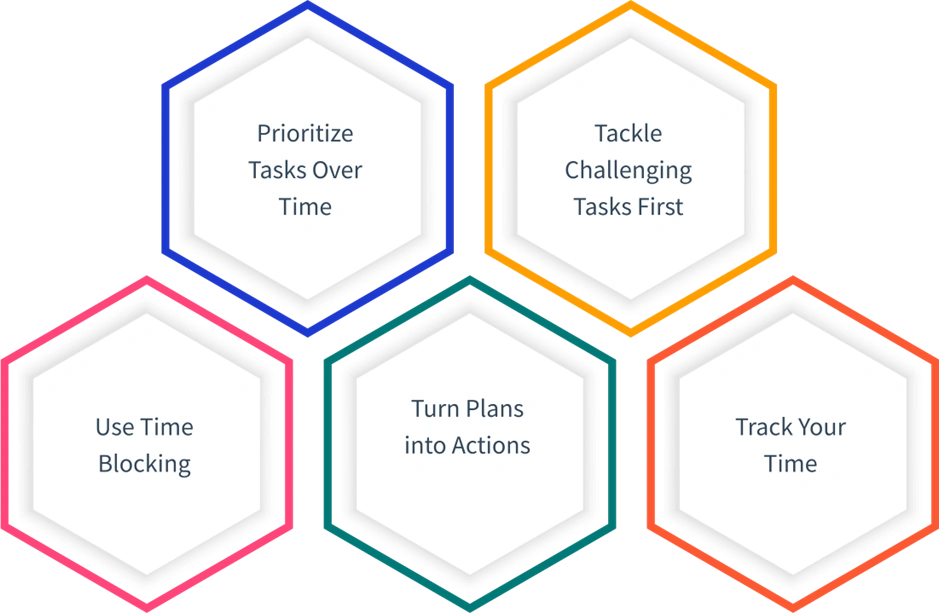Time management myths exist throughout our daily routines as they influence our work methods and planning approaches and success evaluation systems. Time management stands as the key element that people believe leads to success and efficiency and creates balance in life.
But what if current approaches to time management might be ineffective according to the actual results we achieve?
And the instructions you have been given to follow could prevent your development rather than promoting your growth.
You need to question your past beliefs and discover unexpected information about these popular time management myths.
What Time Management Really Means?
People commonly believe time management requires to extract maximum value from each day while maintaining rigid schedules. Time control is not the goal of effective management because it focuses on directing our attention and energy toward our priorities.
The key to effective time management involves understanding when to pause, when to focus deeply, and when to release activities that do not support the main objectives. The focus is to choose mindfully both for staying active and while doing what really adds up.
Time management creates space that benefits productivity alongside creativity, rest, relationships, and a balanced life. Your true goal should be steady progress instead of just being busy.
11 Common Time Management Myths that Need to be Busted
1. The Illusion of Doing Everything
People consistently believe that performing all tasks results in productive work. Trying to handle everything results in excess stress instead of success.
People commonly use multitasking to improve their efficiency, yet it usually produces negative outcomes. A better approach is to give your full attention to the tasks that demand your priority.
Actual time management comes from strategic planning rather than the piling up of more tasks.
Freeing yourself from the need to do everything will allow you to be more productive and focused, ultimately leading to a more balanced lifestyle.
2. A Packed Schedule isn’t Always a Productive One
Many people believe overpacking their schedule leads to effective time management, yet this belief proves wrong. The practice of overloading your schedule leads to negative results because it has no time for rest, unexpected tasks, and important choices.
The strain from this method causes workers to experience stress and lose their focus. The best approach to boost productivity while maintaining productivity involves prioritization, scheduling break time, and implementing efficient time management strategies.
Real control starts by performing required tasks at a required speed to achieve balance.
3. There is a Perfect Time Management Strategy
A lot of people believe that there is a universal time management solution that works for everyone. But the truth is every person needs a different approach for managing time.
Each person needs a different method to boost their productivity levels. Effective time management isn’t one-size-fits-all. It’s about exploring different approaches, recognizing what suits your workflow, and adopting habits that boost productivity while supporting a balanced lifestyle.
4. To-Do List is an Effective Tool for Time Management
People consider to-do lists the ultimate solution for managing their time effectively. The practice of using to-do lists helps, yet they do not always act as the primary solution for achieving effective time management.
The process of creating a to-do list works similarly to writing a grocery list-buying all items does not automatically produce a nutritious dinner. The completion of tasks through checking boxes does not ensure actual progress is made. When used wrongly, lists increase confusion instead of helping in maintaining people's attention on important problems.
Instead of trying to match every task, use the list as an outline to direct your work. Enhancing productivity requires picking tasks that drive progress and discarding everything else to achieve a better life balance.
5. Blaming Distractions: Emails, Calls or Sudden Deadlines
Even while interrupted calls and pings may not be as time-wasting as they first appear, people yet see them as such.
Wind disruptions shouldn't be blamed on a badly built boat. The actual problem? A lack of flexible structure.
Effective time management techniques should be used to plan with breaks while boosting productivity and maintaining organization during unexpected changes in daily routines.
Distractions aren’t the enemy—unpreparedness is.
6. Achieve Perfection Wherever and Whenever Possible
The idea of perfection appears good, yet excessive efforts toward it destroy effective time management practices.
The belief that every task needs to be flawless represents one of the most subtle myths about time management.
The process of car polishing with an engine shutdown results in a shiny appearance without actual movement. However, in real life, aiming for perfection in everything reduces resources, blocks growth, and prevents greater production.
True effective time management does not require flawless execution. The focus should be on progress and purpose while recognizing when satisfying outcomes support your capacity to keep the balance in life.
7. Save Challenging Tasks for the Last
The behaviour of pushing away difficult tasks until later appears easier; however, this is when your energy is at its lowest. The general opinion on time management results in decreased productivity, burnout, and higher procrastination. Starting difficult tasks early, when your mind is clear, boosts productivity, reduces stress, and improves time management.Starting your day by tackling the hardest task makes it easier for all subsequent tasks.
8. Multitasking Whenever Possible
Doing more than one task at once seems cost-effective, but it really results in a loss in performance.
This turns out to be the most misleading myth about time management. Multitasking causes more stress than its positive effects, impairs focus, and increases the likelihood of errors.
Your brain works similarly to an internet browser; it performs poorly when multiple windows are active at once.
Avoid multitasking and concentrate on single-task focalization for increased productivity and effective time management.
9. The Early Bird Catches the Worm
This old saying makes it seem like time management success depends on waking up at sunrise. The fact about productivity is that it doesn't have a standard formula.
Early arrival to work does not ensure that you will complete your goals effectively. The key success factors in time management include strategic planning combined with knowledge of your peak working periods and effective time allocation practices, whether you are a morning person or not.
Irrespective of the time you choose to rise, the key to productivity is to understand why you are starting.
10. The Delusion of Managing Time Itself
Every person receives the same amount of time, which is 24 hours per day.
Many people believe they possess the ability to control time, but this belief remains one of the strongest misconceptions about time management practices. Our true focus lies on managing energy while controlling our areas of attention along with setting our priorities.
It's like trying to keep water in your hands; you may choose what to fill but not stop the flow.
Pushing more in isn't the goal of real efficient time management. It's about focusing on what really helps you toward a balanced life, staying organized, and creating space for what counts.
11. Breaks are a Waste of Time
The feeling of being productive when working continually and without relaxation is counterproductive to performance.
Individuals who believe this widespread belief suffer from increased mental strain and a decline in focus, which leads to stress. According to research, short breaks improve focus and creative thinking, which increases productivity every day.
Because mental energy requires break time. Time management practices that are effective do not involve constant activity. To effectively manage your time, you must know when to stop working so that you can complete your goals.
Why Do These Myths of Time Management Sound So Convincing?
Because they look like productivity.
Multiple studies recommend that people remain busy with multiple tasks across multiple roles while they develop their daily schedule through a process of elimination. These recommendations get a huge acceptance because they are widespread and seem to be logical toward productivity goals.
With these methods you gain time management skills that lead to fast task completion. Continuous usage of these techniques leads to exhaustion while producing high tension and failing to produce results.
The reality? Effective time management enables you to keep focus on significant assignments outside of simple task completion for your daily schedule.
Your goal should aim at locating tactics that create clear results rather than agreeing with basic information.
Time Management Tips that Actually Work
So, what truly works when time management myths start falling apart? These strategies emphasize being thoughtful with your priorities, efforts, and energies.

1. Prioritizing Task before Time
Focus on what really matters instead of the time. Prioritize major tasks. Time management is about doing the right things in the correct order, not about doing everything.
2. Doing the Challenging Task First
When you have the most energy, do the difficult tasks. You can avoid procrastination and gain motivation for the rest of your day by using this "eat the frog" technique.
3. Using the Time Blocking Method
Set up particular time for intense work, emails, breaks, and even relaxation. This technique gives hazy plans structure, which improves the routine and productivity of your day.
4. Don’t Just Plan, Turn it into Actions
Making a good plan is only half of the task. Execution is where the true magic happens. Start by breaking down your objectives into manageable steps. Action, with more than one purpose, is what leads to progress.
5. Track Where Your Time Actually Goes
By keeping track, you may identify time consumers, increase output, and manage your time well while experiencing significantly less stress. To observe where your time goes, use tools such as Time Champ.
You can't improve something that you can't see.
See Where Your Time Really Goes with Time Champ.
Time Champ makes it easy for you to see how you spend your time. It keeps track of activity levels, records logged hours, shows the difference between productive and non-productive work, and even makes sure that the minimum working hours are met.
With these tips, you can cut down on time consumers, make better plans, and increase output all while engaging in real-time management.
Final thoughts
“Good time management isn’t about doing everything. It’s about doing what truly matters”
Time management is successful when decision-making takes dominance over actual time control.
Traditional time management myths lead many people to schedule too much work while attempting to reach perfection through multitasking and creating hectic schedules as a sign of success. When people concentrate on important work rather than taking on extra tasks, real productivity develops.
Getting rid of outdated beliefs will make space for more effective time management strategies, targeted planning, and long-lasting actions.
Creating space for intensive work activities, relaxation, and life balance results in effective time management.
Ditch the Myths & Embrace Smart Time Tracking
Switch to Time Champ and track time accurately!
Signup for FreeBook DemoFAQ’s
Not at all. A properly scheduled day leads to better life quality. Making time for hobbies, relationships, rest, and mental health is another aspect of time management.
Tools can help with time management by providing insights and structure, but personal discipline and conscious decision-making remain crucial for maximizing your time.
Procrastination and poor time management have some similarities, but they also differ significantly. People who procrastinate often show this behavior pattern because they struggle with perfectionism, anxiety, and feeling overwhelmed. The concept of time management improves task completion by breaking down large assignments into smaller, more manageable steps.
Stress, in addition to burnout and anxiety, affects your capacity to make focused decisions and maintain concentration. Practicing mindfulhealth needs will result in long-term efficiency and good time management skills.





